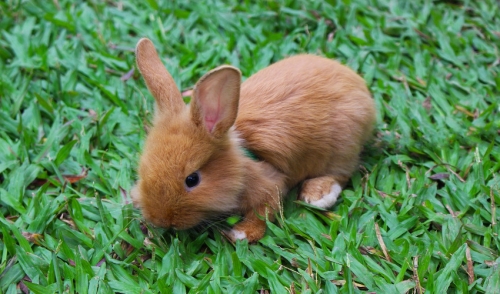{article.name}
Stay Informed
Separating the Bunny from the Rabbit

- Share this:
- Share on Facebook
- Pin on Pinterest
- Tweet on Twitter
Eventually the time comes when every bunny has to be weaned, or taken away, from its mother. This change is one of the most stressful times of a rabbit’s life, but there are certain tricks of the trade that will smooth the transition from the doe’s milk to regular feed.
Rabbits are generally weaned between four and six weeks of age, but they can also go all the way up to eight or nine weeks. The time of weaning will vary depending on the size, breed and preference of the owner as long as the rabbits are old enough and capable to be on fullfeed.
“Weaning at four weeks of age is a great time for better feed efficiency,” said Ron Obermark, Purina’s longtime former rabbitry manager. “Weaning earlier is a cheaper transition because the bunnies are no longer going through the mother for nutrition. For the smaller breeds, you might want to wait a little longer because you’re not worried about maximizing production. You might go up to about 6 weeks then.”
When you’ve decided on the appropriate time to wean the bunnies, remove the doe from the original cage into her own smaller one. By keeping the bunnies in their own cage along with their litter mates, you will reduce their stress. Those that are interested in showing will also often segregate their bunnies so they can better regulate their body condition.
Once you’ve taken the doe – their original food source – from the cage, many recommend gradually working the bunnies onto their full feed. A good rate is starting at 60 percent on the first day, increasing to 80 percent on day two and reaching a full feeding plan on day three. The total amount should equal the amount of food they can
consume in about 20 or 30 minutes.
It is also suggested to feed the bunnies a high fiber diet like Rabbit Chow™ Fibre3®
Natural AdvantEdge™ Rabbit Food. A change in feed should always be done by first mixing it in slowly with the original feed. Long stem grass and timothy hay are also popular choices to add in with a newly weaned bunny.
One of the largest problems rabbit owners will face when they’re weaning bunnies is the appearance of enteritis, or bad diarrhea, in some of their bunnies. Because it is such a stressful time, it often takes a toll on the young rabbits.
“You can tell if there’s enteritis by observing the litter for signs of fecal matter on the backs of litter mate,” Obermark said. “When you see that, segregate that rabbit into a separate cage, and don’t feed it at all for 24 hours. You can then give it a reduced diet for 24 hours.
Special Offers
We are constantly adding new specials to our site. Be sure to check back often!


Comments